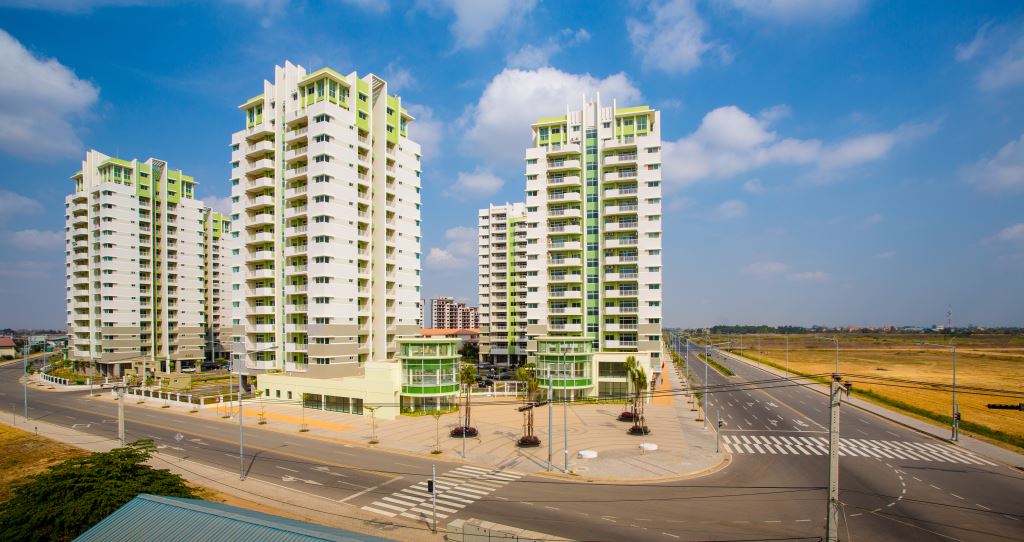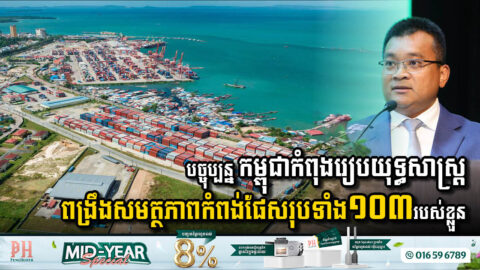Property In Brief
CAMBODIA:
CONDO SALES TO FOREIGNERS ON THE INCREASE
The number of foreigners purchasing condominium units so far this year has increased between 10 and 15% over the same period last year, according to the research department of Bonna Realty Group. Foreigners have purchased about 1,200 condominium units so far in 2014, with most of them being from Singapore, Malaysia, China and Japan, Deputy Research Director Hin Socheat told the Phnom Penh Post. New revisions to laws on foreign ownership are boosting development of the property sector, he said, making foreigners more confident about buying property in Cambodia since they can get a hard title issued by the Ministry of Land Management, Urban Planning and Construction. Condominiums in central Phnom Penh average between $1,500 and $2,800 per square meter, and prices vary according to the quality of construction, the building’s height as well as its exterior and interior design. Khat Sovann of Cam Top Property Group said that some foreigners bought condos to live in, while others bought them to lease out and sell in the future. Most local buyers, he said, purchased condominiums to lease out and make income on rent.
CAMBODIA:
BOREY RIVER TOWN DEVELOPER CONSIDERS NEW PROJECT
The investor behind Borey River Town has announced that it is considering a US$100 million investment in a new commercial and residential development. The new 25-hectare project would have twin villas, single villas, shop houses, flats and more than 10 floors of office space. Construction could start at the end of the year, Teng Rithy, general manager of Borey River Town, told the Phnom Penh Post. He said his company was interested in further investment in the area because city planning will transform the area into a business hub, and a mall, school and hospital will make the area more attractive for residents. He predicts that medium and high-income earners will begin moving to the area due to improved links to central Phnom Penh. Borey River Town is now 50% complete, and about 80% of the units have been sold. The development is made up of 26 twin villas, five single villas and 60 flats.
CAMBODIA:
OFFICE RENTALS JUMP IN FIRST QUARTER
The demand for office space in Cambodia surged in the first quarter of this year as foreign investment continues apace, according to Asia Real Estate. Po Eavkong, the firm’s general manager, told the Phnom Penh Post that research by his company found that demand for Grade-A office space has increased between 10 and 15% while growth in demand for Grade-B space was even higher, between 20 and 25%. The demand for Grade-C space outpaced the all, he added. He told the paper that most of the investors looking for workspace were from Singapore, Malaysia, Japan, and Korea and that he expected demand would continue to grow in the second quarter of 2014. The general manager of Canadia Tower, Thab Rithy, said leased office space there has increased by around 15% this quarter compared with the first three months of 2013. While there is still space in that tower, Phnom Penh Tower on Monivong Boulevard is almost fully occupied. But at least one expert, Nuon Rithy of Bunna Realty Group, said first-quarter demand was fairly stable because many investors were waiting to see how the current tense political situation played out.
PHNOM PENH:
WAREHOUSE DEMAND GROWING STRONG
The demand for warehouse space grew during the first five months of 2014 and expert say desire for storage space is likely to continue heading upward after ASEAN economic integration after 2015. Cambodia Trust Real Estate Director Oum Vutha told the Phnom Penh Post that demand for warehouse space had increased 10 to 15% from January to May 2014 compared with the same period of 2013. He attributed the surge to new companies participating in the Cambodian market. Van Chanthorn of Town Real Estate Company said the demand was likely to double due to the number of investors expected to come into Cambodia toward the end of 2015. He said the areas most in demand are Chamkar Doung, Chorm Chao, Veng Sreng and along national roads 3 and 4. The average size requested ranged from 3,000 to 6,000 square meters, he added, while leases averaged three years and the average price per square meter was US$1.80 per month.
CHINA:
CHINA’S REAL ESTATE CONTROLS COULD START EASING
A slump in property sales and construction has ignited speculation among China watchers that the government’s four-year-old campaign of real estate controls could begin loosening. According to Bloomberg, Citigroup Inc. has described the possibility of “targeted easing,” such as on home purchase restrictions, while the Bank of America has said smaller cities may start relaxing some rules. China experienced a 25% plunge in new construction, which dragged economic growth in the first quarter of this year to its lowest level in six quarters. That has added pressure on Premier Li Keqiang to take measures to avert a stronger slowdown. The nation’s slowdown is partly the result of government policies to curb a US$6 trillion shadow-banking industry and reduce overcapacity and pollution. Measures to cool skyrocketing property prices went into effect in 2010 and included higher interest rates on second mortgages and restrictions on purchases in about 40 cities.
MACAU:
MACAU CONSIDERS INTERVENTION IN PROPERTY SECTOR
Macau’s secretary for transport and public works, Lau Si Io, said he is mulling measures to stabilize the property market, as the government is committed to the housing sector’s healthy development. “We will keep an eye on the results of the measures we’ve launched. We will pay close attention to the development of the market and we will not rule out the possibility of introducing new measures,” he was quoted by TDM News. The Property Agents and Realty Developers Association has indicated that property prices are not likely to decrease in the second half of the year. Its president, Ung Choi Kun, has stressed that although the transaction volume within the property market has dropped, prices are climbing. “Property is in short supply. Before the laws and relevant regulations are in place, developers and administration’s hands are tied on this issue,” he said.
THAILAND:
COUP’S IMPACT ON REAL ESTATE REMAINS LIMITED
The real estate industry in Thailand remains unfazed by the coup declared by the country’s military on May 22, according to global property services firm JLL. The company said many players in the Thai property sector appear “immune” to the political situation and will likely make it over this hurdle as they have in the past. “Our discussions with clients and business partners, including property developers, investors and corporate occupiers, showed that the coup came by no surprise,” Suphin Mechuchep, managing director at JLL, told the website Property Report. However, she added that new players might be scared off by the country’s political uncertainties, citing a slowdown in late 2013 when the political tension escalated. The Bangkok Post reported in late May that many luxury developers are sticking to their timetables, since politics has a minimal effect on buyers in the extreme high-end segment, said Sorapoj Techakraisri, CEO of Pace Development Corporation, which is building the country’s future tallest tower, the 77-storey, mixed-use MahaNakhon.
CHINA:
PROPERTY SLOWDOWN ‘NORMAL’, OFFICIAL SAYS
The slowdown in China’s property market is a normal adjustment after very strong past performance, a senior housing ministry official said in early June, as the sector’s problems raise fears that it could hurt the broader economy. Feng Jun, chief economist at the Ministry of Housing and Urban-Rural Development, said the government will continue to curb speculation in cities where home prices still face upward pressure, even as the overall market slows. After a strong performance in 2013, China’s real estate market has softened as sales slow and banks become more cautious about lending to developers and home buyers. The property sector accounts for more than 15% of China’s annual economic output and affects 40 other industries. Therefore, analysts see the property slowdown as a major risk to the economy, which in 2014 might grow at the weakest pace in 24 years. Official figures show the growth of property investment, construction activities and sales slowed in the first four months as developers cut their pace of expansion.
INDONESIA:
ELECTIONS TO SLOW PROPERTY SECTOR: EXPERTS
Analysts say the country’s property sector will likely slow as the Indonesian presidential election in July approaches. A study by Moody’s Investors Service found that buyers are waiting until the results of the elections are clear. Combined with higher mortgages, loan restrictions and Indonesia’s slowing economy, the local real estate market is predicted to slump this quarter. “We expect revenue growth [in the property sector] will slow to 11% in 2014, from 29% in 2013, as a result of a high base of comparison last year and slower-than-expected marketing sales,” Jacintha Poh of Moody’s told The Bangkok Post. Global property services firm Jones Lang LaSalle Indonesia also forecasts a softer market demand in the luxury apartment segment, and the condominium segment is expected to weaken in the coming months as a reaction to the recent interest rate rise to 7.5% by the Indonesian central bank. The July 9 elections will name the successor of two-term President Susilo Bambang Yudhoyono, who is constitutionally barred from seeking a third term in office.
MYANMAR:
YANGON’S CHINATOWN NOW A BOOMTOWN DISCOVERED BY EXPATS, TOURISTS
The property market in Yangon’s Chinatown is rapidly changing and prices are climbing as the neighborhood becomes increasingly popular with tourists and expats. The area, which has been the center of Yangon’s Chinese community since 1824, has become a favored stop in the nightlife circuit, with its late-night beer shops and restaurants serving as a magnet. In addition, foreigners have begun renting here, Maung Aye of the Myanmar Real Estate Service Association, told the Myanmar Times, partly because they cannot buy land. He said that 30% of the houses in the district are rented by foreigners. Prices have risen so rapidly that many potential buyers have been priced out of the market. There are some concerns about gentrification and that as the district’s popularity grows, long-time residents could be pushed out. However, there are some heritage restrictions in place that aim to preserve the fundamental character of the area.
VIETNAM:
VIETNAM ATTRACTING MORE INTERNATIONAL PROPERTY BUYERS
As Vietnam’s economy improves, its property market is following closely behind, attracting investors from countries including Singapore, Japan and South Korea, according to Savills Vietnam. Managing Director Neil MacGregor told a Vietnam-Singapore business forum in Ho Chi Minh City that property buyers from South East Asia now see Vietnam as an important investment destination and that economic improvements meant the real estate market had bottomed out. Savills sees bright prospects for the second half of 2014 and into 2015, with increasing investment in residential buildings as well as hotels and offices. Vietnam is in direct contrast with some other Asian markets which are currently overheating, with prices set to correct dramatically in the future. “While the market has a strong appetite for operating assets with stable yields and lower risks, the distressed property seekers are active, especially local development/investment groups utilizing their local knowledge and networks,” MacGregor said. Measures to improve Vietnam’s economy have included a US$1.4 billion stimulus package from the government and the creation of a partnership between investors, contractors, building material suppliers and local banks.
- Video Advertisement -



 ខ្មែរ
ខ្មែរ







